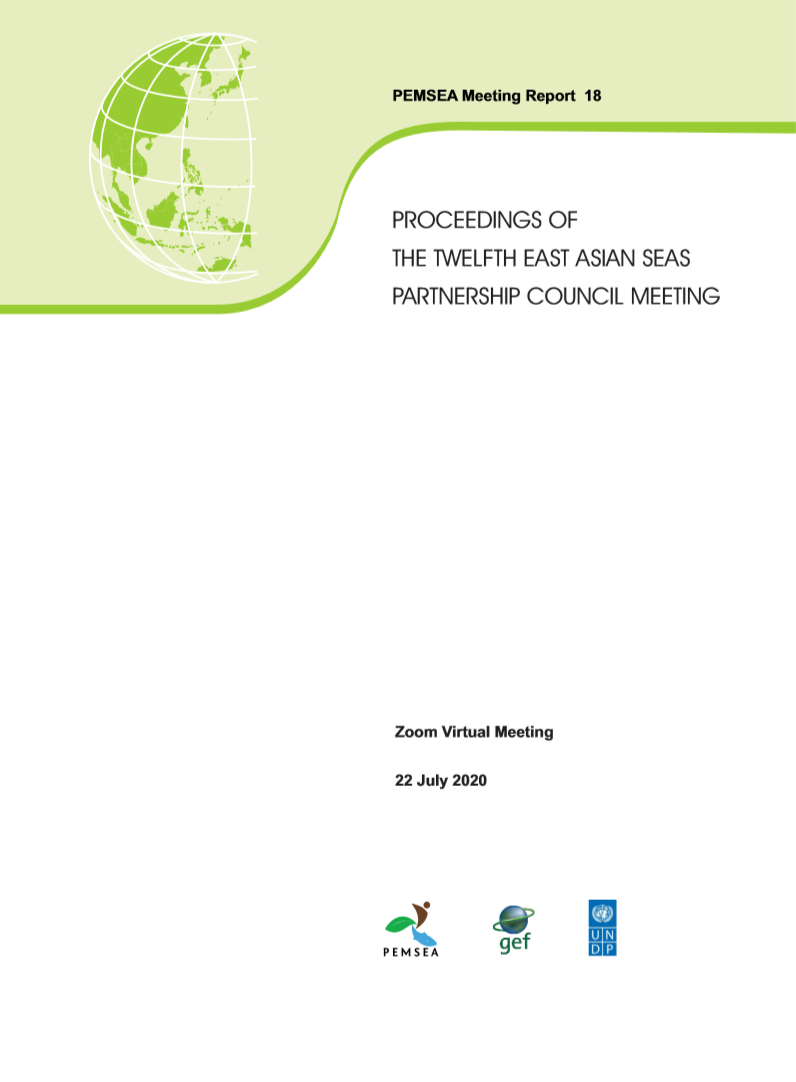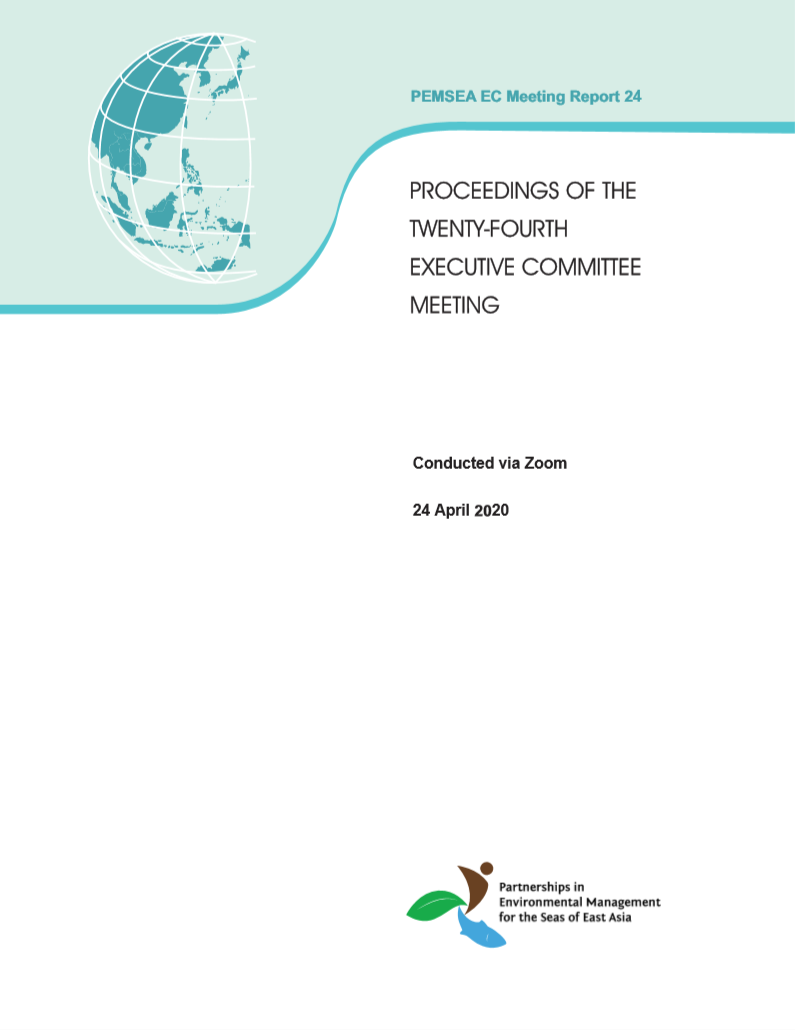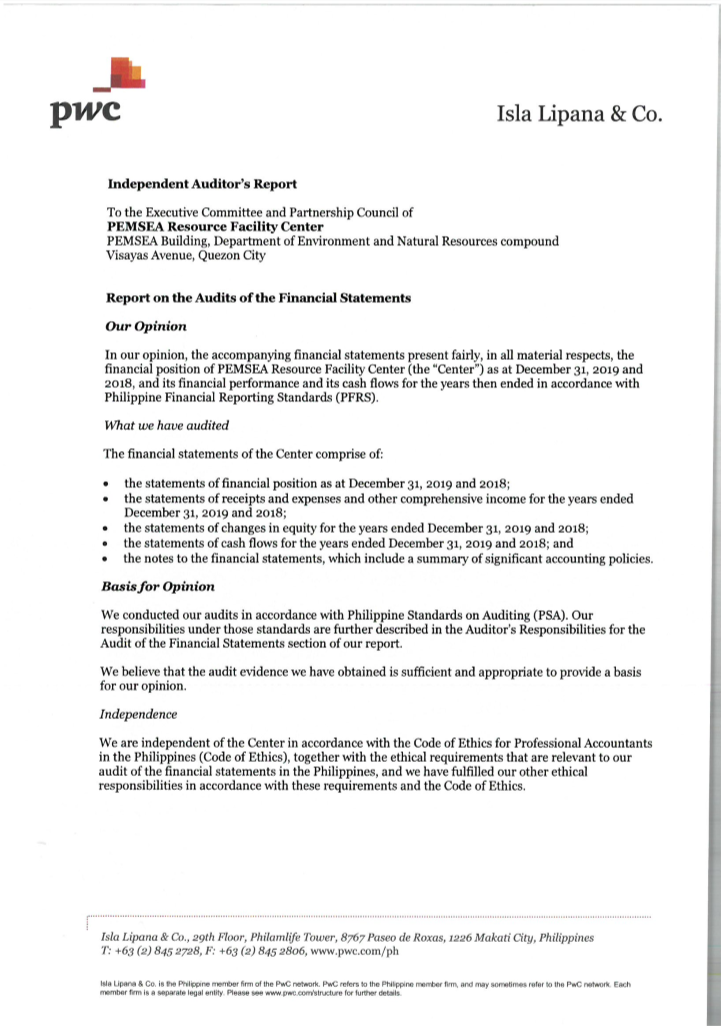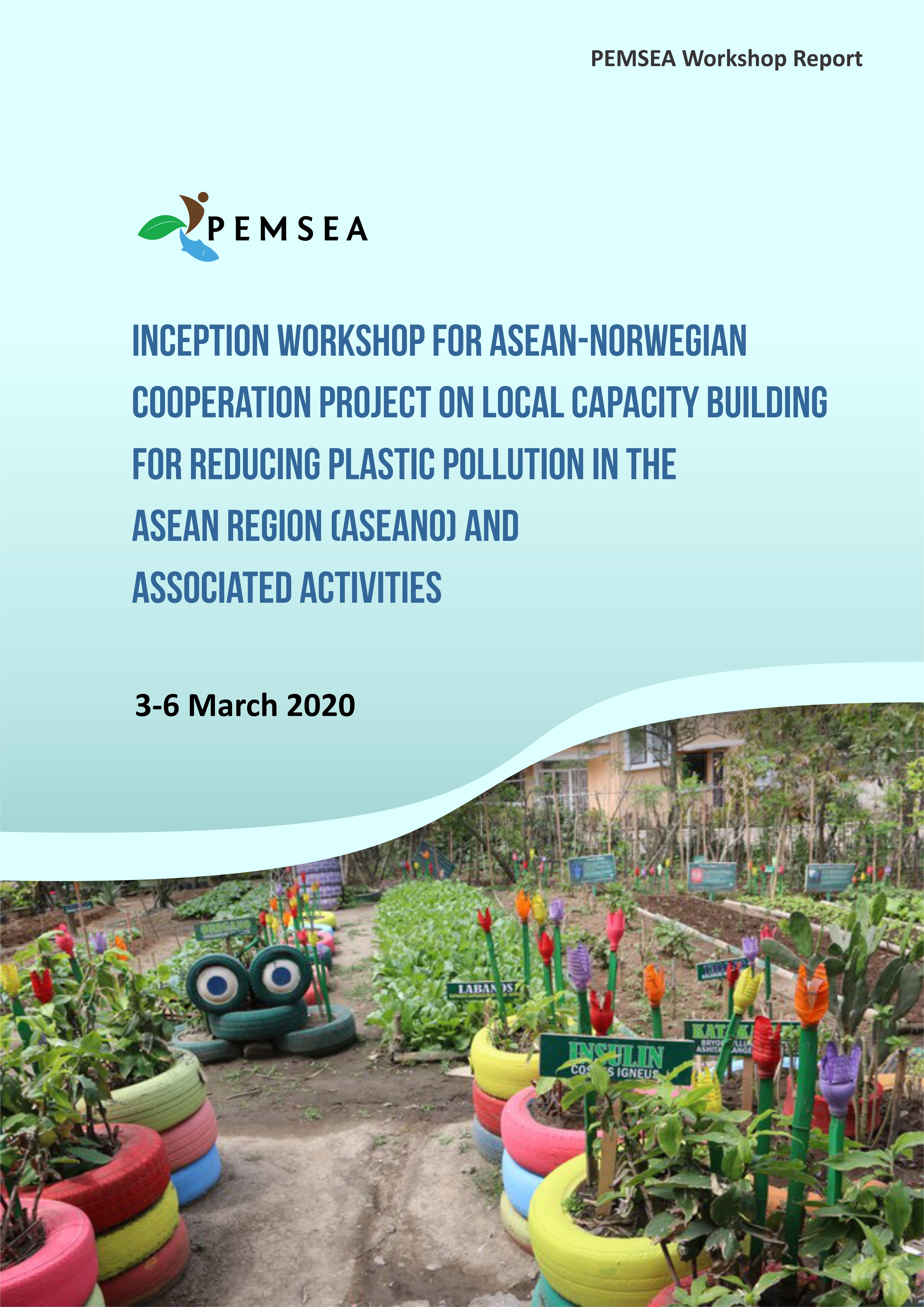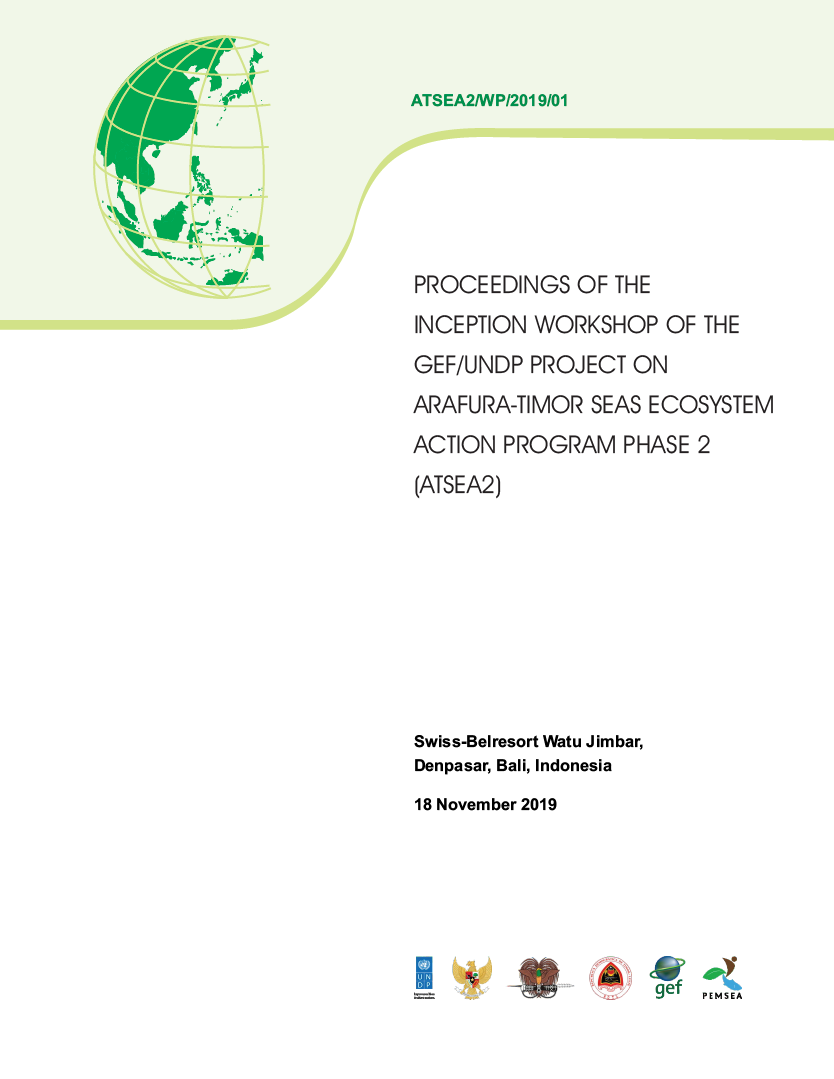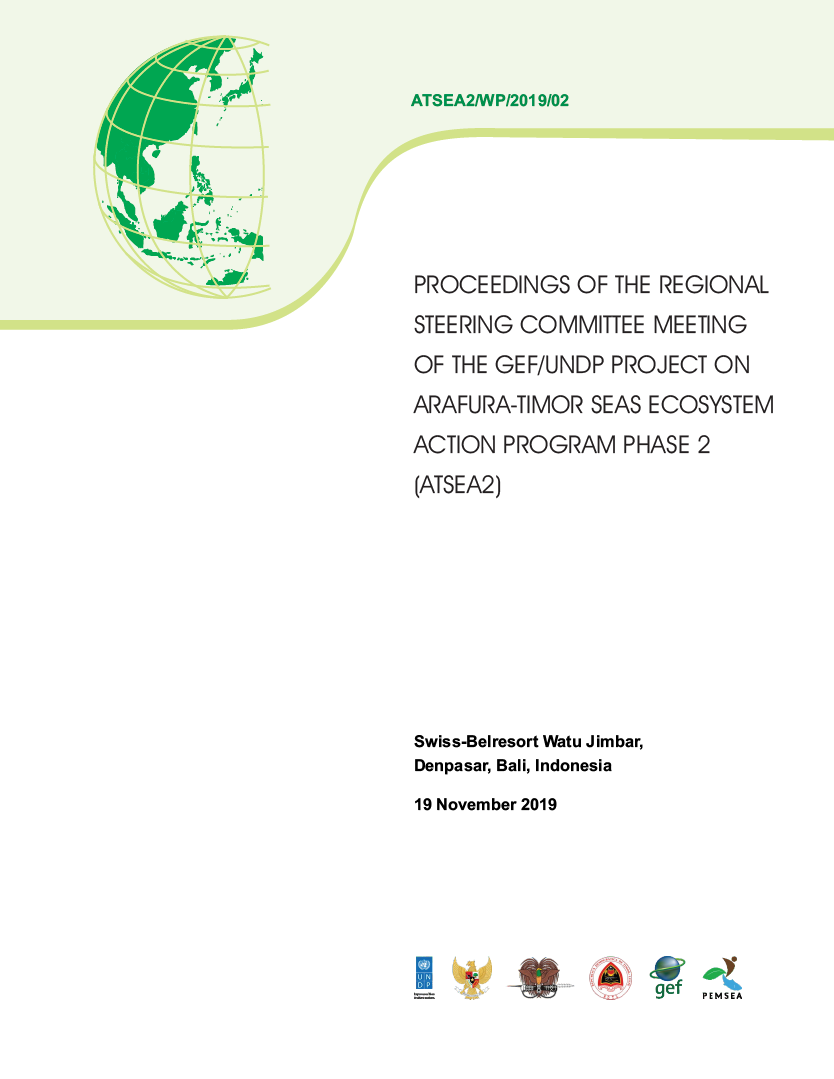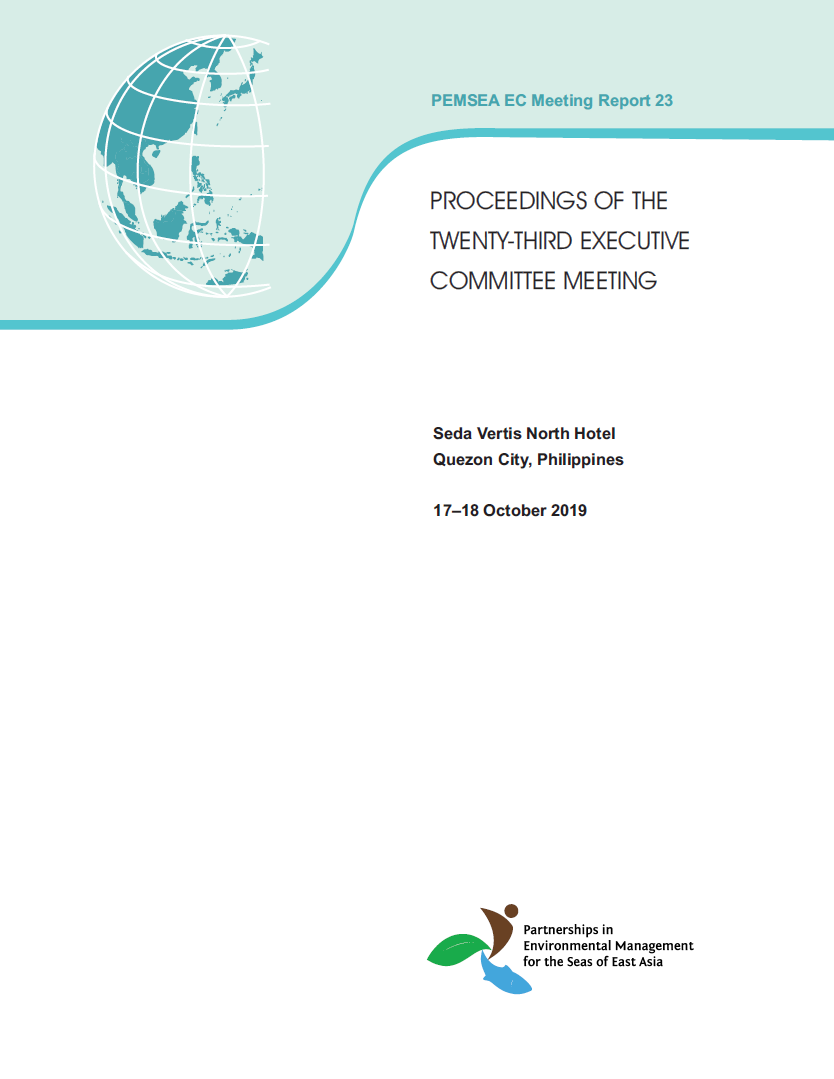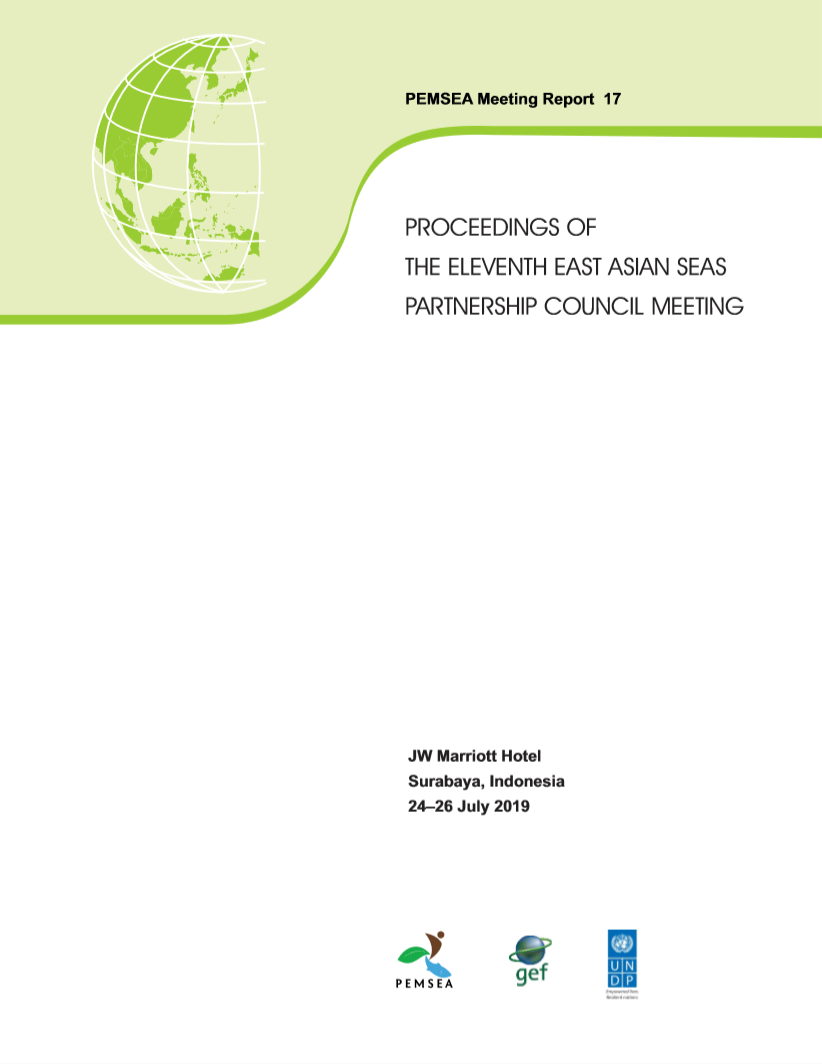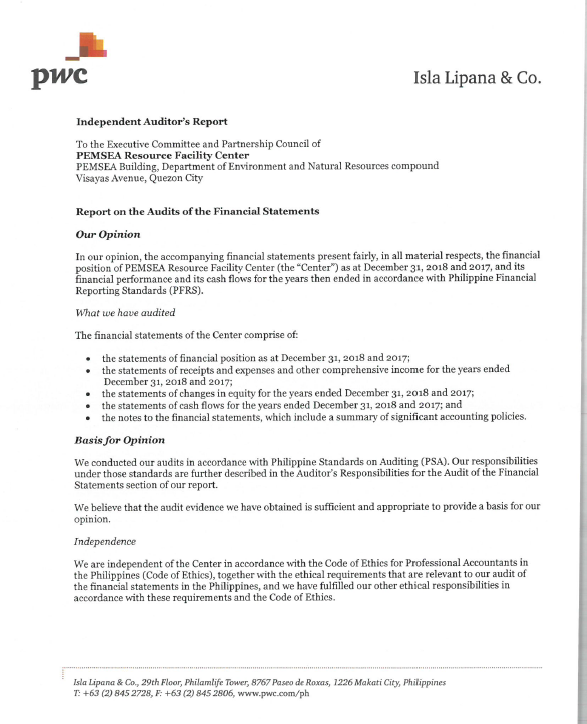
Breadcrumb
Proceedings of the Twelfth East Asian Seas Partnership Council Meeting
The 12th East Asian Seas (EAS) Partnership Council Meeting was held virtually through a zoom video conference call on 22 July 2020. The Meeting was attended by representatives from ten PEMSEA Country Partners namely: Cambodia, China, Indonesia, Japan, Lao PDR, Philippines, RO Korea, Singapore, Timor Leste, and Vietnam. Representatives from PEMSEA Non-Country Partners were also in attendance, namely: ASEAN Biodiversity Center (ACB); International Environmental Management of Enclosed Coastal Seas Center (EMECS); International Union for Conservation of Nature – Asia Regional Office (IUCN); Korea Marine Environment Management Corporation (KOEM); Marine Biodiversity Institute of Korea (MABIK);Northwest Pacific Action Plan (NOWPAP); Ocean Policy Research Institute – The Sasakawa Peace Foundation (OPRI-SPF); Oil Spill Response Limited (OSRL); Plymouth Marine Laboratory (PML); PEMSEA Network of Local Governments for Sustainable Coastal Development (PNLG) Secretariat; UNDP/GEF Yellow Sea LME Project II (YSLME). Representatives from China PEMSEA Center and the United Nations Development Programme (UNDP) Philippines participated as observers. The PEMSEA Resource Facility (PRF) served as the Secretariat for the meeting.
DOCUMENT NUMBER DOCUMENT TITLE PC/20/DOC/01a List of Documents PC/20/DOC/01b List of Participants PC/20/DOC/01c Council and Technical Session Provisional Agenda PC/20/DOC/01d Council and Technical Session Annotated Agenda PC/20/DOC/02 Summary of Recommendations and Decisions of the 11th EAS Partnership Council (July 2019) and the 23rd Executive Committee Meeting (April 2019) and 24th Executive Committee (April 2020), Status of Actions Taken PC/20/DOC/03 Report of the Council Chair PC/20/DOC/04 Report of the Executive Director PC/20/DOC/05 Inclusion of NIVA as New PEMSEA Non-Country Partner PC/20/DOC/06a Designation of PEMSEA’s Regional Center for Excellence: COMI PC/20/DOC/06b Annex 1. Selected Papers of COMI 2014 – 2018 PC/20/DOC/6c Annex 2. Selected Research Projects PC/20/DOC/6d Annex 3. Training Programs PC/20/DOC/6e Annex 4. External Review Summary COMI PC/20/DOC/07 Mid-term Review of the SDS-SEA Implementation Plan (2018-2022) PC/20/DOC/08 EAS Congress 2021 PC/20/DOC/09a UNDP/GEF Scaling Up SDS-SEA PC/20/DOC/09b UNDP/GEF ATSEA-2 PC/20/DOC/09c ASEANO Marine pollution Capacity Building project PC/20/DOC/09d UNDP/GEF IRBM (project in the pipeline) PC/20/DOC/09e Blue solutions for reducing maritime transport GHG emissions through increased energy efficiency of ship and port activities in East Asia PC/20/DOC/10a Intergovernmental Session Provisional Agenda PC/20/DOC/10b Intergovernmental Session Annotated Agenda PC/20/DOC/11a COVID-19 and its implications on PEMSEA’s Post-2020 Sustainability Plans PC/20/DOC/11b Annex A. Country Measures Against COVID-19 PC/20/DOC/11c Annex B. Impacts of COVID-19 on Project Implementation PC/20/DOC/11d Annex C. PEMSEA’s Current and Pipeline Projects PC/20/DOC/11e Annex D. Best Case Scenario Sources of Revenues and Forecast Budget Expenditure for 2021 PC/20/DOC/11f Annex E. Initial Topics PEMSEA can focus on in 2021 and beyond PC/20/DOC/12a Selection and Appointment of PRF Executive Director 2021-2023 PC/20/DOC/12b Annex 1. PEMSEA Rules of Governance Annex 4 – Selection and Appointment of the PRF Executive Director PC/20/DOC/12c Annex 2. PEMSEA Rules of Governance Annex 11 – Revised Terms of Reference of the Executive Committee PC/20/DOC/12d Annex 3. Brief Timeline on Recruitment of Previous PRF Executive Directors PC/20/DOC/12e Annex 4. Terms of Reference of the ED from the PRF Re-engineering Plan PC/20/DOC/12f Annex 5. PEMSEA Annual Report 2018 PC/20/DOC/12g Annex 6. Executive Director’s Reflection 2018 PC/20/DOC/12h Annex 7. Report of the Executive Director 2018 PC/20/DOC/12i Annex 8. PEMSEA Annual Report 2019 PC/20/DOC/12j Annex 9. Endorsement from the Department of Environment and Natural Resources (DENR), Philippines PC/20/DOC/13 PEMSEA Corporate Work Plan and Budget 2020 and 2021
Proceedings of the Twenty-fourth Executive Committee Meeting
The 24th Executive Committee Meeting was conducted via zoom on April 24, 2020. The meeting was participated by EAS Partnership Council Chair, Mr. Arief Yuwono; Technical Session Chair, Dr. Jae Ryoung Oh; Intergovernmental Session Chair, Dr. Vu Thanh Ca; Council Co-Chair, Dr. Vann Monyneath; Technical Session Co-Chair; Dr. Keita Furukawa; and Intergovernmental Session Co-Chair Mrs. Chen Yue. Members of the PEMSEA Audit Committee, the Ministry of Natural Resources (MNR), PR China, and the Department of Environment and Natural Resources (DENR), Philippines participated as observers.
DOCUMENT NUMBER DOCUMENT TITLE EC/24/DOC/01a List of Documents EC/24/DOC/01b Meeting Agenda EC/24/DOC/02 PRF Financial Statements 2019 EC/24/DOC/03 Work Plan and Budget for 2020-2021 EC/24/DOC/04a Implications of COVID-19 on PEMSEA's Operations EC/24/DOC/04b Annex A: PEMSEA's Projects: Current and Pipeline EC/24/DOC/04c Annex B: COVID-19 Scenarios for 2021 EC/24/DOC/05a EAS Congress 2021
EC/24/DOC/05b EAS Congress 2021 Preparation Update EC/24/DOC/06 Proposed Meeting Agenda EC/24/DOC/07a Application of NIVA as a PEMSEA Non-Country Partner EC/24/DOC/07b Designation of PEMSEA's Fourth RCOE
Inception workshop for ASEAN-Norwegian cooperation project on local capacity building for reducing plastic pollution in the ASEAN region (ASEANO) and associated activities
Representatives from PEMSEA, NIVA, and CSEAS undertook a trip to Cavite, Philippines, facilitated by Cavite PG-ENRO, to study the proposed pilot site for the Philippine sub-component of the ASEANO project, to meet relevant stakeholders, and to launch the sub-component through an inception workshop with relevant stakeholders from the city of Dasmariñas and nearby areas.
During two days of site visits, various sites along the river were visited and documented, and local stakeholders including politicians and academe representatives were met. These visits allowed the project team to obtain a better picture of existing waste reduction efforts along the Imus river. For the river, the project team observed an expected increase in pollution levels as the river moved downstream, and observed numerous areas of waste accumulation and points of waste entry into the river. The university stakeholders, Cavite State University and De La Salle University Dasmariñas, expressed great support for the project and are enthusiastic about becoming involved in the research component of the project. Local politicians were also supportive, and referred us to their various material recovery schemes, which across different jurisdictions performed similar material recovery including producing biogas, recycling plastic into new products such as bags and ecobricks, and creating charcoal.
The Inception Workshop held on 5th March brought together stakeholders and interested parties with the dual aims of introducing these parties to the project and providing an opportunity for the project team to ask questions of these individuals. Local inputs and recommendations were sought on a number of different topics, and these inputs will be used to guide the project going forwards.
A project team meeting comprising of core representatives from Cavite, PEMSEA, NIVA and CSEAS, was held to reflect on the learnings of the previous days and chart the way forward for the Philippine sub-component. Existing information will be compiled into a background report on the Imus river, which will be included as a section within the overall ASEANO project’s baseline report. Further smaller meetings and discussions are expected over the coming months, and future in person meetings are expected around the middle of the year.
Proceedings of the ATSEA 2 Inception Meeting
The Inception Workshop of the GEF/UNDP Project on Implementation of Arafura and Timor Seas Regional and National Strategic Programs: Second Phase of the Arafura-Timor Seas Ecosystem Action Program (ATSEA 2) was held at the Swiss-Belresort Watu Jimbar, Denpasar, Bali, Indonesia on 18 November 2019.
The Workshop was attended by representatives from Indonesia, Timor Leste, Papua New Guinea and Australia. Representatives from the United Nations Development Program (UNDP) Country Offices of Indonesia, Timor Leste and Papua New Guinea, and the UNDP Regional Hub Bangkok were also present on behalf of the Global Environment Facility (GEF) and the UNDP. Stakeholder partner organizations from the Coral Triangle Center (CTC), World Wide Fund for Nature (WWF) Indonesia, Indonesian Seas Large Marine Ecosystem (ISLME), and Yayakan Conservasi Alam Nusantara (YKAN) were also represented during the Workshop. The PEMSEA Resource Facility (PRF) served as Secretariat for the Workshop, with local support from UNDP Indonesia.
The publication summarizes the proceedings of the Inception Workshop. Powerpoint presentations delivered during the workshop are herewith accessible.
DOCUMENT NUMBER DOCUMENT TITLE
ATSEA2/DOC/01 Inception Workshop Objectives
ATSEA2/DOC/02 ATSEA1 Background and Lessons Learned
ATSEA2/DOC/03 Project Structure, Overall Goals, Objectives and Outcomes
ATSEA2/DOC/04 Project Strategic Results Framework
ATSEA2/DOC/05 Stakeholder Partnership Forum
ATSEA2/DOC/06 YCAN TNC Presentation
ATSEA2/DOC/07 ISLME Presentation
ATSEA2/DOC/08 CTC Presentation
ATSEA2/DOC/09 ATSEA IW M&E
ATSEA2 Regional Steering Committee Meeting
The Regional Steering Committee Meeting of the GEF/UNDP Project on Implementation of Arafura and Timor Seas Regional and National Strategic Programs: Second Phase of the Arafura-Timor Seas Ecosystem Action Program (ATSEA 2) was held at the Swiss-Belresort Watu Jimbar, Denpasar, Bali, Indonesia on 19 November 2019.
The RSC Meeting was attended by representatives from Indonesia, Timor Leste, Papua New Guinea and Australia. Representatives from the United Nations Development Program (UNDP) Country Offices of Indonesia, Timor Leste and Papua New Guinea, and the UNDP Regional Hub Bangkok were present on behalf of the Global Environment Facility (GEF) and the UNDP. The PEMSEA Resource Facility (PRF) served as Secretariat for the Meeting, with local support from UNDP Indonesia.
The publication summarizes the proceedings of the first RSC Meeting of the ATSEA2 Project. Powerpoint presentations delivered during the meeting are herewith accessible.
DOCUMENT NUMBER DOCUMENT TITLE
ATSEA2RSC/DOC/01 ATSEA2 Inception Workshop Key Takeaways
ATSEA2RSC/DOC/02 Terms of Reference of the RSC and NPB
ATSEA2RSC/DOC/03 Regional Work Plan and Budget 2019-2020
ATSEA2RSC/DOC/04 Indonesia Work Plan and Budget 2019-2020
ATSEA2RSC/DOC/05 Timor-Leste Work Plan and Budget 2019-2020
ATSEA2RSC/DOC/06 Papua New Guinea Work Plan and Budget 2019-2020
Proceedings of the Twenty-third Executive Committee Meeting
The 23rd Executive Committee Meeting was held at Seda Vertis North Hotel, Quezon City, Philippines on 17-18 October 2019. The Meeting was attended by EAS Partnership Council Chair, Mr. Arief Yuwono; Intergovernmental Session Chair, Dr. Vu Thanh Ca; Technical Session Chair, Dr. Jae Ryoung Oh; Council Co-Chair, Dr. Vann Monyneath; and Technical Session Co-Chair who participated through teleconference. Representatives from the Philippines participated as observers. The PRF served as Secretariat for the meeting.
DOCUMENT NUMBER DOCUMENT TITLE EC/23/DOC/01b Meeting Agenda EC/23/DOC/03 Actions Taken on Matters Raised at the 11th Partnership Council Meeting EC/23/DOC/04 PEMSEA and the Decade of Ocean Science EC/23/DOC/05 Designation of RCOE EC/23/DOC/06.1 Update on other RCOEs EC/23/DOC/06.2 Updates on PNLG-PNLC Joint Event EC/23/DOC/06.3a Knowledge Product on PEMSEA's Experience in Blue Economy and Investment EC/23/DOC/06.3b Enabling Blue Economy Investment for Sustainable Development in the Seas of East Asia EC/23/DOC/07a PEMSEA Port-2020 Development of an Operational Plan EC/23/DOC/07b Draft Operational Plan EC/23/DOC/07c SDS-SEA IP Objectives, Indicators, and Targets
Proceedings of the Eleventh East Asian Seas Partnership Council Meeting
The 11th East Asian Seas Partnership Council Meeting was held at the JW Marriott Hotel, Surabaya, Indonesia from 24 to 26 July 2019. The Ministry of Environment and Forestry (MOEF) of Indonesia co-hosted the Meeting. The Meeting was attended by representatives from nine PEMSEA Partner Countries namely: Cambodia, Indonesia, Japan, Lao PDR, Philippines, RO Korea, Singapore, Timor-Leste and Vietnam. Five representatives from Non-Country Partners were in attendance, namely: ASEAN Centre for Biodiversity (ACB), International EMECS Center, Korea Marine Environment Management Corporation (KOEM), Ocean Policy Research Institute – The Sasakawa Peace Foundation (OPRI-SPF); Plymouth Marine Laboratory (PML) and the Intergovernmental Oceanographic Commission Sub-Commission for the Western Pacific (IOC/WESTPAC). Representatives from Thailand, the Coral Triangle Initiative Coral Reefs, Fisheries and Food Security (CTI-CFF), and the United Nations Development Programme (UNDP) Philippines participated as observers. The Partnership Council focused on the following key issues: (a) Results of the EAS Congress 2018 and Sixth Ministerial Forum; (2) Post-2020 Futures Strategy and Report; (3) Election of new Partnership Council officers; (4) PEMSEA and the Decade of Ocean Science, among others. The publication summarizes the proceedings of the meeting.
DOCUMENT NUMBER DOCUMENT TITLE PC/19/DOC/01a List of Documents PC/19/DOC/01b List of Participants PC/19/DOC/01c Council Session Provisional Agenda PC/19/DOC/01d Council Session Annotated Agenda PC/19/DOC/02 Summary of Decisions and Recommendations PC/19/DOC/03 Report of the Council Chair PC/19/DOC/04 Report of the Executive Director PC/19/DOC/07a Technical Session Provisional Agenda PC/19/DOC/07b Technical Session Annotated Agenda PC/19/DOC/08 EAS Congress 2018 and Sixth Ministerial Forum PC/19/DOC/9a PEMSEA Post-2020 Futures Report and Strategy/Post-2020 Plan PC/19/DOC/10 Update on the SDS-SEA Project PC/19/DOC/11 PEMSEA and the Decade of Ocean Science
